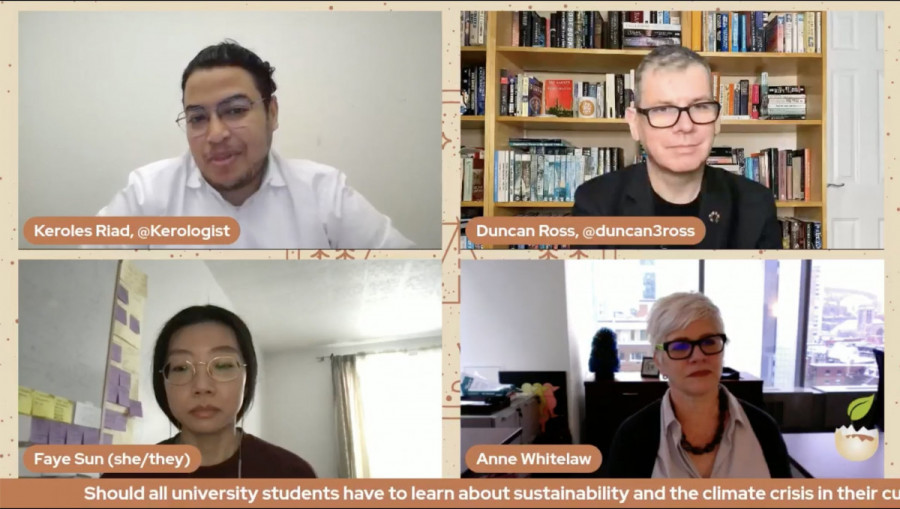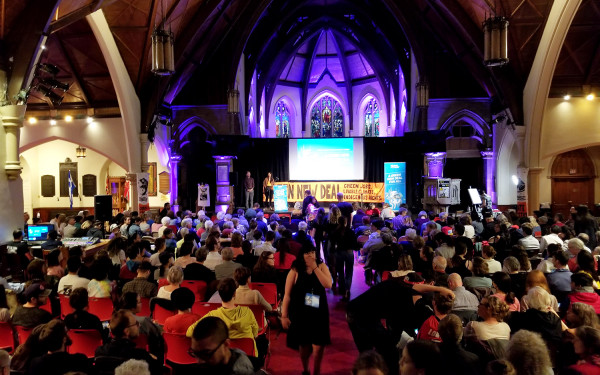Waste Not Want Not’s virtual fireside chat discussed details of a new sustainability curriculum
In CSU’s recent by-election 88 percent of voters supported the new change.
The Concordia group Waste Not Want Not organized a fireside chat on Thursday morning to discuss the details of the university's new proposed sustainability curriculum.
The speakers were Concordia student union’s sustainability coordinator Faye Sun, Concordia’s provost and vice president academic Anne Whitelaw, and chief data officer from Times Higher Education Duncan Ross.
The new curriculum was proposed in question four of the CSU’s recent by-elections which asked “do you agree to call on Concordia University to make an institutional commitment that all Concordia students will learn about sustainability and the climate crisis in their curriculum by 2030?” The question had a record-breaking turnout of 21.2 per cent and 88 per cent of voters answered “yes”, but what does this mean for students?
Ross explained how crucial the work of universities is for sustainability. “Universities and higher education more broadly represent about 1.7 per cent of gross world product, it’s a huge part of human endeavor, so just in terms of its economic impact, universities and higher education has a key role to play.”
Aside from economic importance, Ross said the role of universities in improving sustainability can be broken down into four main categories. These are in research, community work, their work as overseers of significant resources, and in teaching.
“The broad question is how can we make sure that graduates can go out into the world understanding how they can make a change for the better, whatever role they may end up in,” said Ross. He added that this goes beyond the more focused application of a sustainability curriculum in STEM courses such as agriculture and aquaculture.
Whitelaw said that there are two approaches universities could take to a sustainability curriculum. The first is a more rigid idea of “checking a box” for the completion of a sustainability course, and the other is a more integrated sustainability curriculum that applies to each individual’s discipline.
“I’m not a big fan of checking the box,” said Whitelaw, “What are some of the ways we can develop [an integrated sustainability curriculum] at a faculty level, and at a department level that will allow notions of sustainability to be part of the curriculum and other areas?” This is similar to the Indigenous Directions Action Plan first published in 2019 and relaunched in 2021 where the university is working to decolonize the curriculum, rather than having students simply take a mandatory course.
Concordia’s faculty of fine arts has been implementing sustainability into its programs by looking at the materials used in students’ art practice and how they can be more sustainable. At-home learning and the need for at-home art kits has helped force faculty to develop solutions to toxic art materials. Most student’s homes don’t have the proper ventilation systems, so faculty had to send materials that would be safe to use and aren’t as bad for the environment because of their lower toxicity.
Sun, who did her bachelors in philosophy at Queen’s University also spoke on how sustainability can be implemented in non STEM courses.
“Generally I would say philosophy programs don’t incorporate enough sustainability issues into the curriculum in terms of courses, as well as content, but I do see a lot of potential,” Sun said. She added that the one sustainability related philosophy class she took in her final year at Queens was enough to make her pursue a degree in environmental science at Concordia. “Just one course is enough,” she said.
“Being in a philosophy program already opens you up to a certain kind of training that basically teaches you how to see different perspectives, and that to me is really important,” said Sun. She thinks these different perspectives would make students more open to performing actions that reflect those perspectives.
Sun suggested a more interdisciplinary curriculum that incorporates Indigenous worldviews or other cultural understandings of the environment. “That just opens up a whole new world of finding solutions to the problems that we’re facing that can be localized to different areas of the world,” she said.
One possible approach to a sustainability curriculum would see students take a required sustainability elective. Whitelaw opposed this idea as she believed the responsibility of teaching these would only fall on the shoulders of professors already teaching sustainability as part of their program, such as environmental science.
“I don’t think that’s the right approach because then you’re saying ‘it’s somebody else's problem, it’s not my problem’,” Whitelaw said.
A criticism of the proposed question on the by-election ballot has been that the year 2030 is too far in the timeline. During the talk, a clip was played from an interview with Concordia professor Damon Matthews who thinks the timeline should be shortened. “2030 is about when we need to have this problem under control, so the time for action and information and movement is now and the next few years.”
At the end of the talk, mediator Keroles Riad admitted that he didn’t write “closing remarks” on the schedule. He said, “I don’t think this conversation should end now or end here at Concordia. It’s important for us to keep working not only to get this done at Concordia but to set an example and start a national movement across Canada.”


_600_832_s.png)

_(1024x719)_600_375_90_s_c1.jpg)


